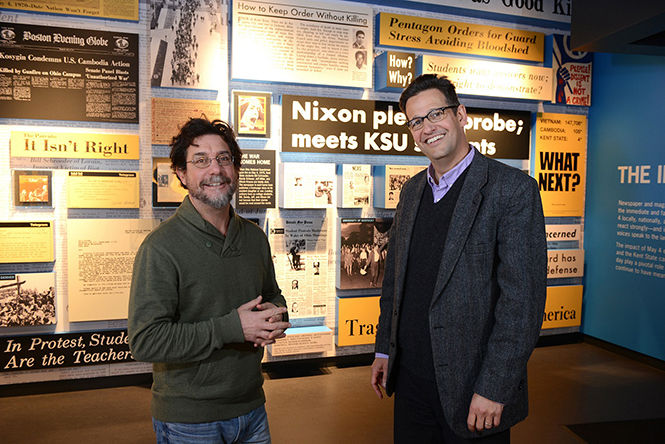KSU faculty members awarded Oral History Association Award for Work on May 4, 1970 Voices documentary
December 4, 2014
Two Kent State faculty members were awarded the 2014 Oral History Association’s Oral History in a Non-print Format Award for their documentary film, “May 4th Voices: Kent State, 1970.”
David Hassler, the director of the Wick Poetry Center, and Kenneth Bindas, professor and chair of the Department of History, collaborated to produce a documentary version of Hassler’s play, “May 4th Voices.” The film combined the voices from the 1,200 pages of transcripts, telling the stories of community members, students and guardsmen who were present during the May 4, 1970 shooting.
“The play was an opportunity to have all the voices heard and to hear these multiple truths that were emotionally true,” Hassler said.
Having grown up in Kent, Hassler was 6 years old on May 4, 1970, and didn’t understand the actions of the event happening around him. This served as his inspiration to create the play.
“I grew up with this memory of this traumatic event but a kind of silence around it,” Hassler said. “As a child, no adults in my world talked to me very clearly about what happened and sheltered me from it. As a Kent City public school kid, May 4, 1970 was never taught in school. We always somehow ran out of time in history class.”
By combining all the different voices together, Hassler gives viewers multiple perspectives from that moment.
“I think one of the things that come across, mostly in the play, is the multiple voices,” Bindas said. “People are trying to understand their place in this moment. I think when people see the DVD or watch the play, they come away with how a person’s perspective, where they’re located within that moment, really identifies how they understand that moment.”
The different perspectives heard in the play show how tension rose through poor communication and triggered the tragedy that occurred that day.
“The play shows how every community and every individual life has its own conflicts and shows how it can constantly erupt in violence when we fail to hear the voice of the other,” Hassler said. “Violence, like all war, is a failure of the imagination. Meaning, it’s a failure to inhabit the life of another and to understand, through empathy, where he or she might be deriving their particular actions or points of view.”
Katherine Burke, who directed the play and documentary, said she wants viewers to understand that the people who were involved in the shooting, both the National Guard and students, were young people, just like the actors portraying them.
“We have to look deeply at this event,” Burke said. “And other events like it, so we can learn from them and have compassion for each other, so we can have a more just and peaceful world.”
Contact Alyssa Schmitt at [email protected].

























